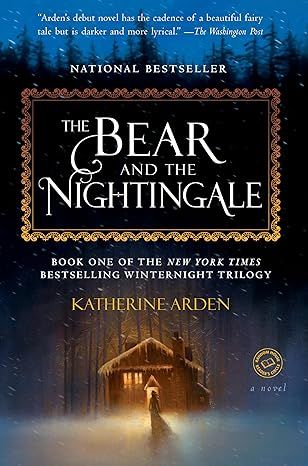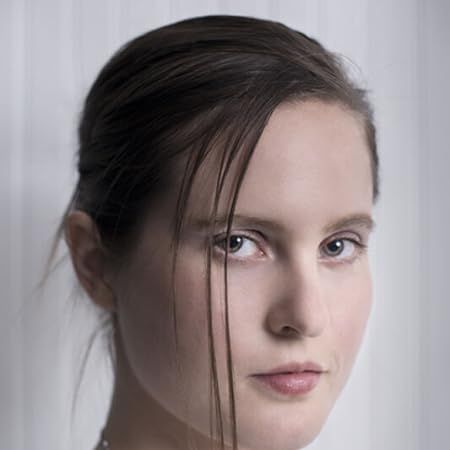The Bear and the Nightingale: A Novel (Winternight Trilogy)
4.4
-
16,897 ratings
Katherine Arden’s bestselling debut novel spins an irresistible spell as it announces the arrival of a singular talent with a gorgeous voice. “A beautiful deep-winter story, full of magic and monsters and the sharp edges of growing up.”—Naomi Novik, bestselling author of Uprooted
Winter lasts most of the year at the edge of the Russian wilderness, and in the long nights, Vasilisa and her siblings love to gather by the fire to listen to their nurse’s fairy tales. Above all, Vasya loves the story of Frost, the blue-eyed winter demon. Wise Russians fear him, for he claims unwary souls, and they honor the spirits that protect their homes from evil.
Then Vasya’s widowed father brings home a new wife from Moscow. Fiercely devout, Vasya’s stepmother forbids her family from honoring their household spirits, but Vasya fears what this may bring. And indeed, misfortune begins to stalk the village.
But Vasya’s stepmother only grows harsher, determined to remake the village to her liking and to groom her rebellious stepdaughter for marriage or a convent. As the village’s defenses weaken and evil from the forest creeps nearer, Vasilisa must call upon dangerous gifts she has long concealed—to protect her family from a threat sprung to life from her nurse’s most frightening tales.
Praise for The Bear and the Nightingale
“Arden’s debut novel has the cadence of a beautiful fairy tale but is darker and more lyrical.”—The Washington Post
“Vasya [is] a clever, stalwart girl determined to forge her own path in a time when women had few choices.”—The Christian Science Monitor
“Stunning . . . will enchant readers from the first page. . . . with an irresistible heroine who wants only to be free of the bonds placed on her gender and claim her own fate.”—Publishers Weekly (starred review)
“Utterly bewitching . . . a lush narrative . . . an immersive, earthy story of folk magic, faith, and hubris, peopled with vivid, dynamic characters, particularly clever, brave Vasya, who outsmarts men and demons alike to save her family.”—Booklist (starred review)
“An extraordinary retelling of a very old tale . . . The Bear and the Nightingale is a wonderfully layered novel of family and the harsh wonders of deep winter magic.”—Robin Hobb
Read more
Kindle
$13.99
Available instantly
Audiobook
$0.00
with membership trial
Hardcover
$16.59
Paperback
$10.39
Ships from
Amazon.com
Payment
Secure transaction
ISBN-10
1101885955
ISBN-13
978-1101885956
Print length
368 pages
Language
English
Publisher
Del Rey
Publication date
June 26, 2017
Dimensions
5.5 x 0.8 x 8.3 inches
Item weight
10.2 ounces
Frequently bought together
Popular Highlights in this book
Nothing changes, Vasya. Things are, or they are not. Magic is forgetting that something ever was other than as you willed it.
Highlighted by 1,696 Kindle readers
In Russian, Frost was called Morozko, the demon of winter. But long ago, the people called him Karachun, the death-god. Under that name, he was king of black midwinter who came for bad children and froze them in the night.
Highlighted by 1,207 Kindle readers
You are too attached to things as they are, said Morozko, combing the mare’s withers. He glanced down idly. You must allow things to be what best suits your purpose. And then they will.
Highlighted by 1,163 Kindle readers
Sleep is cousin to death, Vasya, he murmured over her head. And both are mine.
Highlighted by 1,115 Kindle readers
The serving-women muttered that she could tame animals, dream the future, and summon rain.
Highlighted by 831 Kindle readers
Product details
ASIN :
B00X2FDZKW
File size :
10425 KB
Text-to-speech :
Enabled
Screen reader :
Supported
Enhanced typesetting :
Enabled
X-Ray :
Enabled
Word wise :
Enabled
Editorial reviews
“Arden’s debut novel has the cadence of a beautiful fairy tale but is darker and more lyrical.”—The Washington Post
“Vasya [is] a clever, stalwart girl determined to forge her own path in a time when women had few choices.”—The Christian Science Monitor
“Stunning . . . will enchant readers from the first page. . . . with an irresistible heroine who wants only to be free of the bonds placed on her gender and claim her own fate.”—Publishers Weekly (starred review)
“Utterly bewitching . . . a lush narrative . . . an immersive, earthy story of folk magic, faith, and hubris, peopled with vivid, dynamic characters, particularly clever, brave Vasya, who outsmarts men and demons alike to save her family.”—Booklist (starred review)
“Arden’s supple, sumptuous first novel transports the reader to a version of medieval Russia where history and myth coexist.”—Kirkus Reviews (starred review)
“Radiant . . . a darkly magical fairy tale for adults, [but] not just for those who love magic.”—Library Journal
“An extraordinary retelling of a very old tale . . . A Russian setting adds unfamiliar spice to the story of a young woman who does not rebel against the limits of her role in her culture so much as transcend them. The Bear and the Nightingale is a wonderfully layered novel of family and the harsh wonders of deep winter magic.”—Robin Hobb
“A beautiful deep-winter story, full of magic and monsters and the sharp edges of growing up.”—Naomi Novik
“Haunting and lyrical, The Bear and the Nightingale tugs at the heart and quickens the pulse. I can’t wait for Katherine Arden's next book.”—Terry Brooks
“The Bear and the Nightingale is a marvelous trip into an ancient Russia where magic is a part of everyday life.”—Todd McCaffrey
“Enthralling and enchanting—I couldn’t put it down. This is a wondrous book!”—Tamora Pierce
Read more
Sample
It was late winter in northern Rus’, the air sullen with wet that was neither rain nor snow. The brilliant February landscape had given way to the dreary gray of March, and the household of Pyotr Vladimirovich were all sniffling from the damp and thin from six weeks’ fasting on black bread and fermented cabbage. But no one was thinking of chilblains or runny noses, or even, wistfully, of porridge and roast meats, for Dunya was to tell a story.
That evening, the old lady sat in the best place for talking: in the kitchen, on the wooden bench beside the oven. This oven was a massive affair built of fired clay, taller than a man and large enough that all four of Pyotr Vladimirovich’s children could have fit easily inside. The flat top served as a sleeping platform; its innards cooked their food, heated their kitchen, and made steam-baths for the sick.
“What tale will you have tonight?” Dunya inquired, enjoying the fire at her back. Pyotr’s children sat before her, perched on stools. They all loved stories, even the second son, Sasha, who was a self-consciously devout child, and would have insisted—had anyone asked him—that he preferred to pass the evening in prayer. But the church was cold, the sleet outside unrelenting. Sasha had thrust his head out-of-doors, gotten a faceful of wet, and retired, vanquished, to a stool a little apart from the others, where he sat affecting an expression of pious indifference.
The others set up a clamor on hearing Dunya’s question: “Finist the Falcon!”
“Ivan and the Gray Wolf!” “Firebird! Firebird!”
Little Alyosha stood on his stool and waved his arms, the better to be heard over his bigger siblings, and Pyotr’s boarhound raised its big, scarred head at the commotion.
But before Dunya could answer, the outer door clattered open and there came a roar from the storm without. A woman appeared in the doorway, shaking the wet from her long hair. Her face glowed with the chill, but she was thinner than even her children; the fire cast shadows in the hollows of cheek and throat and temple. Her deep-set eyes threw back the firelight. She stooped and seized Alyosha in her arms.
The child squealed in delight. “Mother!” he cried. “Matyushka!” Marina Ivanovna sank onto her stool, drawing it nearer the blaze.
Alyosha, still clasped in her arms, wound both fists around her braid. She trembled, though it was not obvious under her heavy clothes. “Pray the wretched ewe delivers tonight,” she said. “Otherwise I fear we shall never see your father again. Are you telling stories, Dunya?”
“If we might have quiet,” said the old lady tartly. She had been Marina’s nurse, too, long ago.
“I’ll have a story,” said Marina at once. Her tone was light, but her eyes were dark. Dunya gave her a sharp glance. The wind sobbed outside. “Tell the story of Frost, Dunyashka. Tell us of the frost-demon, the winter-king Karachun. He is abroad tonight, and angry at the thaw.”
Dunya hesitated. The elder children looked at each other. In Russian, Frost was called Morozko, the demon of winter. But long ago, the people called him Karachun, the death-god. Under that name, he was king of black midwinter who came for bad children and froze them in the night. It was an ill-omened word, and unlucky to speak it while he still held the land in his grip. Marina was holding her son very tightly. Alyosha squirmed and tugged his mother’s braid.
“Very well,” said Dunya after a moment’s hesitation. “I shall tell the story of Morozko, of his kindness and his cruelty.” She put a slight emphasis on this name: the safe name that could not bring them ill luck. Marina smiled sardonically and untangled her son’s hands. None of the others made any protest, though the story of Frost was an old tale, and they had all heard it many times before. In Dunya’s rich, precise voice it could not fail to delight.
“In a certain princedom—” began Dunya. She paused and fixed a quelling eye upon Alyosha, who was squealing like a bat and bouncing in his mother’s arms.
“Hush,” said Marina, and handed him the end of her braid again to play with.
“In a certain princedom,” the old lady repeated, with dignity, “there lived a peasant who had a beautiful daughter.”
“Whasser name?” mumbled Alyosha. He was old enough to test the authenticity of fairy tales by seeking precise details from the tellers.
“Her name was Marfa,” said the old lady. “Little Marfa. And she was beautiful as sunshine in June, and brave and good-hearted besides. But Marfa had no mother; her own had died when she was an infant. Although her father had remarried, Marfa was still as motherless as any orphan could be. For while Marfa’s stepmother was quite a handsome woman, they say, and she made delicious cakes, wove fine cloth, and brewed rich kvas, her heart was cold and cruel. She hated Marfa for the girl’s beauty and goodness, favoring instead her own ugly, lazy daughter in all things. First the woman tried to make Marfa ugly in turn by giving her all the hardest work in the house, so that her hands would be twisted, her back bent, and her face lined. But Marfa was a strong girl, and perhaps possessed a bit of magic, for she did all her work un- complainingly and went on growing lovelier and lovelier as the years passed.
“So the stepmother—” seeing Alyosha’s open mouth, Dunya added, “—Darya Nikolaevna was her name—finding she could not make Marfa hard or ugly, schemed to rid herself of the girl once and for all. Thus, one day at midwinter, Darya turned to her husband and said, ‘Husband, I believe it is time for our Marfa to be wed.’
“Marfa was in the izba cooking pancakes. She looked at her step- mother with astonished joy, for the lady had never taken an interest in her, except to find fault. But her delight quickly turned to dismay.
“ ‘—And I have just the husband for her. Load her into the sledge and take her into the forest. We shall wed her to Morozko, the lord of winter. Can any maiden ask for a finer or richer bridegroom? Why, he is master of the white snow, the black firs, and the silver frost!’
“The husband—his name was Boris Borisovich—stared in horror at his wife. Boris loved his daughter, after all, and the cold embrace of the winter god is not for mortal maidens. But perhaps Darya had a bit of magic of her own, for her husband could refuse her nothing. Weeping, he loaded his daughter into the sledge, drove her deep into the forest, and left her at the foot of a fir tree.
“Long the girl sat alone, and she shivered and shook and grew colder and colder. At length, she heard a great clattering and snapping. She looked up to behold Frost himself coming toward her, leaping among the trees and snapping his fingers.”
“But what did he look like?” Olga demanded.
Dunya shrugged. “As to that, no two tellers agree. Some say he is naught but a cold, crackling breeze whispering among the firs. Others say he is an old man in a sledge, with bright eyes and cold hands. Others say he is like a warrior in his prime, but robed all in white, with weapons of ice. No one knows. But something came to Marfa as she sat there; an icy blast whipped around her face, and she grew colder than ever. And then Frost spoke to her, in the voice of the winter wind and the falling snow:
“ ‘Are you quite warm, my beauty?’
“Marfa was a well-brought-up girl who bore her troubles uncomplainingly, so she replied, ‘Quite warm, thank you, dear Lord Frost.’ At this, the demon laughed, and as he did, the wind blew harder than ever. All the trees groaned above their heads. Frost asked again, ‘And now? Warm enough, sweetheart?’ Marfa, though she could barely speak from the cold, again replied, ‘Warm, I am warm, thank you.’ Now it was a storm that raged overhead; the wind howled and gnashed its teeth until poor Marfa was certain it would tear the skin from her bones. But Frost was not laughing now, and when he asked a third time: ‘Warm, my darling?’ she answered, forcing the words between frozen lips as blackness danced before her eyes, ‘Yes . . . warm. I am warm, my Lord Frost.’
“Then he was filled with admiration for her courage and took pity on her plight. He wrapped her in his own robe of blue brocade and laid her in his sledge. When he drove out of the forest and left the girl by her own front door, she was still wrapped in the magnificent robe and bore also a chest of gems and gold and silver ornaments. Marfa’s father wept with joy to see the girl once more, but Darya and her daughter were furious to see Marfa so richly clad and radiant, with a prince ’s ransom at her side. So Darya turned to her husband and said, ‘Husband, quickly! Take my daughter Liza up in your sledge. The gifts that Frost has given Marfa are nothing to what he will give my girl!’
“Though in his heart Boris protested all this folly, he took Liza up in his sledge. The girl was wearing her finest gown and wrapped in heavy fur robes. Her father took her deep into the woods and left her beneath the same fir tree. Liza in turn sat a long time. She had begun to grow very cold, despite her furs, when at last Frost came through the trees, cracking his fingers and laughing to himself. He danced right up to Liza and breathed into her face, and his breath was the wind out of the north that freezes skin to bone. He smiled and asked, ‘Warm enough, darling?’ Liza, shuddering, answered, ‘Of course not, you fool! Can you not see that I am near perished with cold?’
“The wind blew harder than ever, howling about them in great, tearing gusts. Over the din he asked, ‘And now? Quite warm?’ The girl shrieked back, ‘But no, idiot! I am frozen! I have never been colder in my life! I am waiting for my bridegroom Frost, but the oaf hasn’t come.’ Hearing this, Frost’s eyes grew hard as adamant; he laid his fingers on her throat, leaned forward, and whispered into the girl’s ear, ‘Warm now, my pigeon?’ But the girl could not answer, for she had died when he touched her and lay frozen in the snow.
“At home, Darya waited, pacing back and forth. ‘Two chests of gold at least,’ she said, rubbing her hands. ‘A wedding-dress of silk velvet and bridal-blankets of the finest wool.’ Her husband said nothing. The shadows began to lengthen and there was still no sign of her daughter. At length, Darya sent her husband out to retrieve the girl, admonishing him to have care with the chests of treasure. But when Boris reached the tree where he had left his daughter that morning, there was no treasure at all: only the girl herself, lying dead in the snow. “With a heavy heart, the man lifted her in his arms and bore her back home. The mother ran out to meet them. ‘Liza,’ she called. ‘My love!’
“Then she saw the corpse of her child, huddled up in the bottom of the sledge. At that moment, the finger of Frost touched Darya’s heart, too, and she fell dead on the spot.”
There was a small, appreciative silence.
Then Olga spoke up plaintively. “But what happened to Marfa? Did she marry him? King Frost?”
“Cold embrace, indeed,” Kolya muttered to no one in particular, grinning.
Dunya gave him an austere look, but did not deign to reply.
“Well, no, Olya,” she said to the girl. “I shouldn’t think so. What use does Winter have for a mortal maiden? More likely she married a rich peasant, and brought him the largest dowry in all Rus’.”
Olga looked ready to protest this unromantic conclusion, but Dunya had already risen with a creaking of bones, eager to retire. The top of the oven was large as a great bed, and the old and the young and the sick slept upon it. Dunya made her bed there with Alyosha.
The others kissed their mother and slipped away. At last Marina herself rose. Despite her winter clothes, Dunya saw anew how thin she had grown, and it smote the old lady’s heart. It will soon be spring, she comforted herself. The woods will turn green and the beasts give rich milk. I will make her pie with eggs and curds and pheasant, and the sun will make her well again.
But the look in Marina’s eyes filled the old nurse with foreboding.
Read more
About the authors
Katherine Arden
Born in Austin, Texas, Katherine Arden spent her junior year of high school in Rennes, France.
Following her acceptance to Middlebury College in Vermont, she deferred enrolment for a year in order to live and study in Moscow. At Middlebury, she specialized in French and Russian literature.
After receiving her BA, she moved to Maui, Hawaii, working every kind of odd job imaginable, from grant writing and making crêpes to serving as a personal tour guide. After a year on the island, she moved to Briançon, France, and spent nine months teaching. She then returned to Maui, stayed for nearly a year, then left again to wander. Currently she lives in Vermont, but really, you never know.
She is the author of The Bear and the Nightingale.
Read more
Reviews
Customer reviews
4.4 out of 5
16,897 global ratings
Out of this World Reviews
5
Historical fantasy fiction at its best. A must-read!
Reviewed in the United States on November 24, 2017
Verified Purchase
The Bear and the Nightingale by Katherine Arden is very much a story in the Uprooted vein. At its simplest, we have a rebellious daughter with hidden talents who must align herself with mythological, dubious intentioned entities else lose the lives of her family, her people, and quite possibly her very way of life. At its simplest, that is the story Arden has crafted, but The Bear and the Nightingale is so much more than that simple synopsis. Set in a rich world full of tradition, politics, and magic, the author strikes the perfect balance between nuanced, vibrant characters with complex motives and personalities and a plot that continuously moves forward.
Vasilisa Petrovna’s birth is marked by death when her mother dies giving her life. Her mother, Marina, who is possessed of special gifts, knows Vasilisa, or Vasya, will be her last child and that she will not survive the ordeal, but she gives birth to her daughter anyway because she knows the gifts Vasya will bring into the world will be even greater than her own. Vasya is raised a wild child. Not because of her father’s lack of tutelage but because she is a creature that will not be controlled. Often she slips into the woods on her own, walking the forest paths and meeting the mythological dwellers there that only she can see. On one such walk she comes upon a great tree and a one-eyed man sleeping at its base. The man is no man at all, but a demon who slumbers now but is slowly waking. Once he does wake, he promises “everlasting life” to any who follow him. His offer is not what it may seem, of course, and so Vasya finds herself in opposition to the waking demon.
Vasya is a headstrong woman in a world where such initiative is not often desired nor praised unless such person is a man. But Konstantin, Vasya’s daughter, is an understanding man who knows his daughter’s fire comes from her mother. I liked Konstantin a lot. He is very much walking a line of his own between the traditional world he lives in and a more progressive one where he sees his daughter’s wild spirit free to do as she pleases. The times when he considers his Vasya toiling over a hot stove and seeing to her children and husband’s needs he is stricken with a heavy heart, for he knows the great potential Vasya possesses would be wasted on such a life. At the very end, Konstantin knows what he has to do to set his daughter free forever; his love for her is strong enough that he never hesitates.
There are many other interesting characters: a priest whose story takes an unforeseen turn when he meets Vasya, a stepmother who embodies much of the atypical stepmother role so often seen in fairy tales, and an ensemble of brothers and sisters who are mostly supportive. Then there are the creatures whom only Vasya can see: vodianoy, vazila, upyrs aplenty, rusalka, and the brothers who are demons whom the real story revolves around. I’ll refrain from delving too much into any one of these, especially the brothers, for fear of giving something away, but suffice to say that the brothers are opposed to one another and Vasya finds herself caught in the middle.
Of the world Arden has built for her novel all I can say is very well done. Set in the world of Rus’, it is very much a Russia that may have existed to some degree but many aspects only in folklore. Still, it is a beautiful depiction of a deep winter world where families huddle together around their oven to sleep and stay warm and where the coming snow cuts off entirely the rural community Vasya calls home from the rest of the world.
The Bear and the Nightingale is historical fantasy fiction at its best. A vibrant world, rich characters, more than a hint of the supernatural, and an endearing main character who doesn’t have all the answers but isn’t afraid to find them makes this a must-read. Vasya’s story continues in The Girl in the Tower. It’s already on my reading list.
Read more
7 people found this helpful
shae
5
This is such a great book!!!
Reviewed in the United States on July 3, 2024
Verified Purchase
After I listened to the audio book, I told my kids about the story and my son's gf was very interested so I bought this for her. She fell in love with the story as well. The book is well made and arrived quickly. I am pleased with the purchase.
4seasons
5
One of my Favorite Books, Perfect for the Wintertime
Reviewed in the United States on December 2, 2017
Verified Purchase
The Bear and this Nightingale blew me away. Be transported into the frigid Russian wilderness, where creatures of fairytales breathe and frost demons wander the woods. Gather around the warmth of the hearth, around the crackling flame, and hear the story of Vasilisa, the girl marked by the winter king.
The atmosphere and setting of this book was magical. The way Arden writes every word and strings them into sentences and build them into pages is enthralling. Her descriptions are vivid, and made the setting come to life. Set in a village on the edge of the woods, in a place where the snow almost never melts, the role of nature plays a key role in both the plot and the setting. Creatures like the domovi, which are the household spirits that protects the inhabitants, and the lake spirit added a mystical quality and dimension. Throughout the pages, I could see the glint of sunlight on frost, feel my breath mist the air, and look out to a landscape of white. A warm house with a roaring flame never felt so good. This book utterly immersed me into a whole new world that I was eager to be lost in.
Vasilisa, or Vasya for short, was a strong main character. The book spans around 16 years, from birth to her as a young woman. During those times, the only future for a girl was marriage or the covenant. But Vasya is not the type to conform to expectations, and it was easy to root for her as she tried to carve her own path. From an early age Vasya ran wild through the forest, and she never grew out of her love for nature and freedom. Unlike most people, she can see the spirits and can communicate with the horses, and that sets her apart as different. She struggles between pleasing her family by doing what's proper and doing what she wants, which is to be free, but even with the conflict it's clear to see the love that binds them together. For although the story centers around her, none of the characters take a backseat here. They were all in this together.
There is a theme of old vs. new, with the pagan gods slowly fading due to the rise of Christianity. The arrival of the priest Konstantin changes the practices of the village, striking fear of the forest creatures into the hearts of the villagers. The creatures are fading, growing weaker, and are unable to protect them from the real enemy. Konstantin isn't your typical villain, and we see the decisions and choices he made that prompted the climax of the story. I despised him and pitied him at the same time.
I love this book. I started this on a school night, thinking I could put it down a few chapters in and go to sleep, but by the time I looked up from the last page it was early morning the next day. The plot simmers, the tension escalating little by little, building towards an explosive finale. The atmosphere was beautiful, and all the characters felt fleshed out and real. (Sidenote: I think I'm slightly obsessed with Morozko. But that's okay. I hope.) This is the perfect book to read by the fireplace during winter, but regardless of the season, I couldn't recommend it more.
Read more
jashodge
5
Magical. Gorgeous. Cinderella meets Anna Karena (sort of).
Reviewed in the United States on February 11, 2017
Verified Purchase
Check out this and other reviews at notapickyreader.blogspot.com
I'll start off by saying that I absolutely loved The Bear and the Nightingale. It reminded me so much of some of the books I read when I was younger, of the Night Circus and Shannon Hale books and books that are original but also based on fairytales or folklore. The writing is fantastic, the storytelling lilting and magical.
The story shifts focus between our protagonist, Vasilisa, better known as Vasya, and another character, Konstantin, the priest that comes to stay in their town. Vasya is not the kind of female heroine one really expects from a story like this - she's not outwardly brave, she's quiet, she often takes the brunt of insults or hurtful words from those around her. However, in the magical world where the cold and forest has it's own kind of magic that those people fear, it is Vasya's kindness that helps her to befriend magical creatures and in the end, help to save those she loves from the more dangerous things in the forest.
While Konstantin is not truly a main character, he is in opposition to Vasya's character. They both attempt to help protect her family but in two very different ways. I loved how their approach differed and how despite the intentions, Vasya's open-mindedness and kindness tends to be more successful that Konstantin's devout yet often times ignorant ideology.
The world is magical and dark and dangerous. It's also bright and romantic. It's one kind of fairytale, one with gods and spirits and the walking dead, within another kind of fairytale, one with Russian aristocracy, a wicked stepmother, and the tensions between Russian lore and religious ideology. It is filled with action, danger, family drama, and a little bit of romance. Cinderella meets Anastasia meets Anna Karena. The story has everything to be successful but I truly think the writing and storytelling is what really makes the Bear and the Nightingale unique and truly shine. You'll be shivering with the cold, be in awe of the Russian court, be scared to look out your window when it's dark. It is so reminiscent of some classic fairytale, told with such elegance, beautiful imagery, and language that immerses the reader in the time period and world.
The language might not be for everyone, sometimes feeling a little heavy or old-fashioned, though I believe that is what really makes the world feel real. The mix of reality with the touch of folklore might not appeal to some, the lines often purposely blurred. However, overall, I think part of the magic of this book are these very things, so I suggest pushing through and giving it a try.
This book was what really helped me get out of my reading slump and reminded me why I love stories like this. It was so refreshing and beautifully told and I highly recommend it to any reader who loves Russian folklore, the tale of East of the Sun West of the Moon, fairytale retellings, or just any well-written magical story with an unlikely heroine. And if you're in a reading slump.
Read more
11 people found this helpful
John
5
My new favorite series!
Reviewed in the United States on May 19, 2021
Verified Purchase
I am a huge lover of cultural anthropology, mythology, folklore, and fairy tales, and this was by far the best book I have read in a long time! It’s categorized as YA Fantasy/Folklore/Fairy tale but it does not feel YA at all when you read it. A lot of Russian cultural research went into the story and even though there were many mythical beings and creatures it never felt hokey or childish.
The story follows Vasya, a young girl who grows up into a woman (at the time in 1300s Russia which means she’s a teen). The author never came right out and said the time of the story but with some historical references I was able to figure it out. It takes place between 1310 and 1350. Vasya is a wild child who loves nature and is not like the other girls. She speaks her mind, which made me love her, and she does not want to get married and be a wife. She has a special ability that she can see all the mythical creatures, beings, and demons of her homeland, a country and wintry part of Russia that made me long for a powdered snowstorm the entire time I was reading it. I would say it’s perfect for a Christmas read, but really I would love it anytime of year. Vasya’s mother was like her, a bit magical, but she died in childbirth. Her father finally remarries so that Vasya can have a stepmother, but her stepmother is cruel. I was so surprised at the stepmother because she had the same abilities, to see demons and creatures, but instead of embracing it like Vasya she was terrified of it and that is why she hates Vasya I believe. Vasya spends her days talkin to horses, because she can speak with animals, and hanging out with the nymph- like woodland creatures. Her nursemaid, Dunya, is her best companion. Secretly, she is trying to protect Vasya from the winter demon who seems to want her for himself. He said she is to have a gem when she is old enough but her family does not want her to have it because they fear it will be bad news for her. The frost/winter demon is the brother of a terrible war bringing winter demon who also wants Vasya. As you can probably guess, it ends in an epic battle between both sides. Another aspect of this book was how Christianity came into a land that still honored the old ways and old gods. This is always interesting to me, especially since I am looking at it from a Christian point of view. Vasya does not want the old ways to die and it was interesting the author personified this concept by having her mythological creatures waste away the less people sacrificed to them or gave to them or believed in them. I am a Christian and I love mythology and the old ways, not as a religion but as a study in historic cultures, so this book was everything I didn’t know I was looking for in a book!
This book was full of magic, action, heart, wintry wonderlands, history, mythology, and so much more. It is the first book in a trilogy. Immediately when I finished this one I ordered the next one so I could keep going. It’s been a long time since I’ve read something I’ve liked so much. It reminded me just how much I love mythology from other cultures and the fun things authors can do with them. My series Chronicles of a Supernatural Huntsman takes mythology from different cultures and places those creatures and beings in the main character’s path, but she is usually fighting them because they’re evil. In The Bear and the Nightingale a lot of the beings were good, household demons or elves or whatever you would like to call them. They were friends with Vasya and hardly did harm.
I highly recommend this read. I breezed right through it and never wanted to put it down. I’m so glad it’s a trilogy and I plan to read all of them.
Read more
13 people found this helpful
Top Katherine Arden titles
View all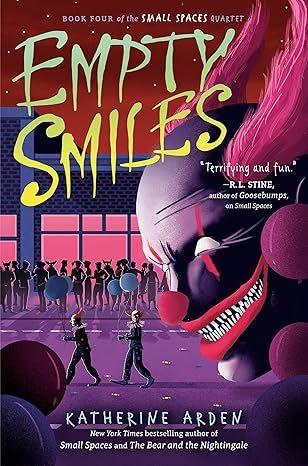
Empty Smiles (Small Spaces Quartet)
4.5
-
514
$8.81
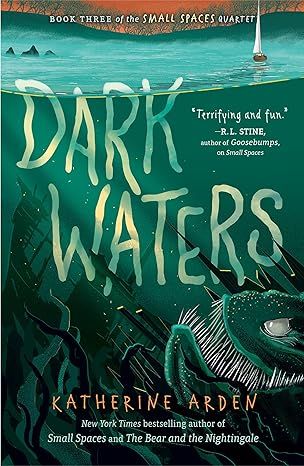
Dark Waters (Small Spaces Quartet)
4.5
-
702
$2.99
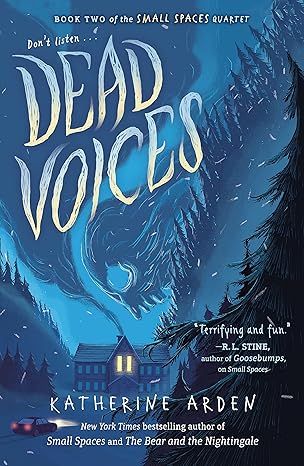
Dead Voices (Small Spaces Quartet)
4.6
-
1,279
$2.99
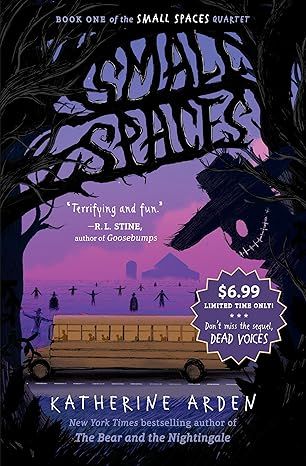
Small Spaces (Small Spaces Quartet)
4.6
-
2,480
$4.99
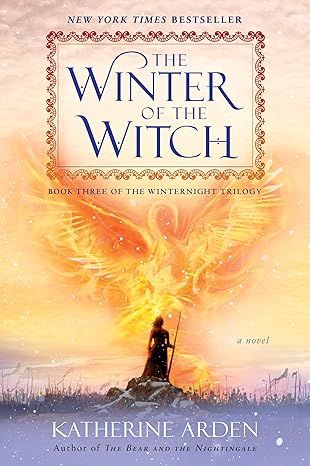
The Winter of The Witch
4.7
-
8,459
$12.95
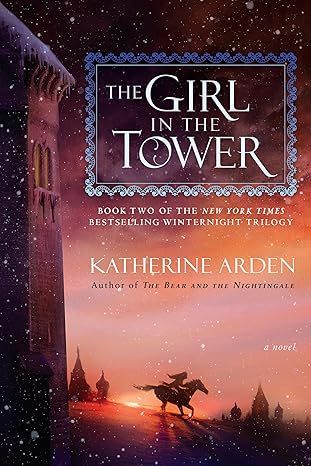
The Girl in the Tower: A Novel (Winternight Trilogy)
4.6
-
9,947
$12.99
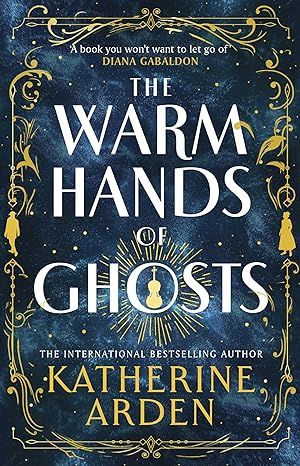
The Warm Hands of Ghosts
4.3
-
1,167
$13.99
Similar Books
Best Sellers
View all
The Tuscan Child
4.2
-
100,022
$8.39

The Thursday Murder Club: A Novel (A Thursday Murder Club Mystery)
4.3
-
155,575
$6.33

Sapiens: A Brief History of Humankind
4.6
-
140,302
$13.49

The Butterfly Garden (The Collector, 1)
4.3
-
88,556
$9.59

Things We Hide from the Light (Knockemout Series, 2)
4.4
-
94,890
$11.66

The Last Thing He Told Me: A Novel
4.3
-
154,085
$2.99

The Perfect Marriage: A Completely Gripping Psychological Suspense
4.3
-
143,196
$9.47

The Coworker
4.1
-
80,003
$13.48

First Lie Wins: A Novel (Random House Large Print)
4.3
-
54,062
$14.99

Mile High (Windy City Series Book 1)
4.4
-
59,745
$16.19

Layla
4.2
-
107,613
$8.99

The Locked Door
4.4
-
94,673
$8.53
